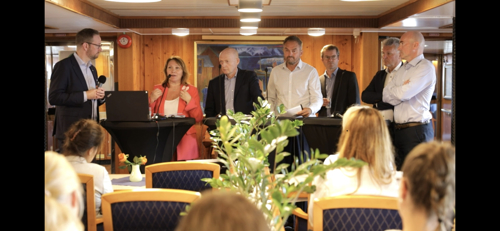ARENDALSUKA: - We have a lot of snacks in Norway
- There's a wide variety of snacks available in Norway, but we need to accelerate the processes, says Pål Runde, Head of Battery Norway, regarding Norwegian raw material production. He participated in a panel discussion about how we can achieve the goals outlined in Norway's mineral strategy.
- Today, finished battery materials are produced in China. However, there are now very strict requirements for sustainability and the amount of recycled raw materials due to new laws developed by the EU this summer, says Pål Runde.
Europe's Largest Producer
Did you know that Norway is Europe's largest producer of some of the critical minerals needed for the green transition, or that we likely have Europe's largest deposit of rare earth elements? This was the starting point for the panel discussion on MS Lofoten during Arendalsuka on Thursday. The participants were:
- Karianne B. Bråthen, Stortingsrepresentant, Næringskomiteen, Arbeiderpartiet
- Rune Volla, Avdelingsdirektør for energi og energiomstilling, Norges Forskningsråd
- Pål Runde, Daglig leder, Battery Norway
- Alf Reistad, Konst. daglig leder, Rare Earths Norway
- Ole Christian Selsås, Direktør for Quarts and mining operations, Elkem
- Henrik Schiellerup, Avdelingsdirektør, NGU
- Ana Maria Martinez, Seniorforsker, SINTEF
- Kurt Aasly, Førsteamanuensis, NTNU
- Gunnar Moe, Administrerende direktør, Rana Gruber
- Stein Mortensholm, Kommunikasjonssjef Industri, SINTEF
- Global Raw Material Crisis
- I believe we are in the midst of a global raw material crisis. At SINTEF, we are developing knowledge and technology that enables robust and sustainable access and utilization of mineral resources that are essential for the green transition. We are to develop new and green technologies and put them into practice, all while preserving nature and the climate. This is extremely demanding and complex, so it requires collaboration with industry, businesses, institutes, research institutions, academic institutions, and authorities, says Ana Maria Martinez, Senior Researcher at SINTEF.
Access to Raw Materials and Expertise
The green transition requires access to various critical metals and minerals. The International Energy Agency (IEA) estimates that demand for such critical raw materials for use in green technology will be four times higher in 2040 than it is today if we are to achieve the goals of the Paris Agreement. Stable access to critical raw materials will be crucial for future security, value creation, industrial development, and jobs. Today, the supply of important metals and minerals is threatened by increasing raw material nationalism, monopolization, and conflict. Therefore, raw material supply is higher than ever on the political agenda. In March, the EU Commission presented its Critical Raw Materials Act, aimed at strengthening sustainable mineral production and increasing the continent's self-sufficiency. On June 21st, the government presented its mineral strategy.
- Expertise should also be added to the list of critical raw materials, says Kurt Aasly, Associate Professor at NTNU.
Access to skilled individuals, recruitment to the industry, and expertise on how to achieve the recycling of raw materials are important in the green transition.
Do We Have the Tools?
- Today, we produce three times as much lithium as we did in 2017. The market value of the minerals we need for an energy transition has doubled in recent years, says Henrik Schiellerup, Division Director at NGU.
The Norwegian economy depends on critical raw materials, and the need will increase as we transition and create jobs in areas like battery production and offshore wind. Simultaneously, we are an exporting mineral nation, and the Norwegian government wants us to take more responsibility for supplying Europe and allied nations due to the uncertainty arising from war and geopolitical turmoil. Therefore, international cooperation is also central to the mineral strategy. Are we ready to develop the world's most sustainable mineral industry? Do we have the tools and pace required?
- We need a different direction, and it needs to be faster. We will do what we can to prioritize this effort. Norway can take a leading position since we have natural energy, technology, and expertise, so Norway can truly achieve sustainable minerals, says Karianne B. Bråthen (Ap), a member of the Parliament's Committee on Industry.
HVA SKJER
Se hele kalenderen >-
ARENDALSUKA: Prosessindustrien: Norges bidrag til Europas sikkerhet!
Vitensenteret (VitenUstillingen) -
ARENDALSUKA: Get-together i regi av NEW Node Eyde Women
Kystveien 2. 4841 Arendal, terrassen i 4.etg (Eyde-klyngens lokaler) -
ARENDALSUKA - Global Outlook 2025
Arendal kulturhus, Store Torungen -
ARENDALSUKA: Batterier – Beredskap og bærekraft i en urolig tid
Vitensenteret (VitenUstillingen) -
Arendalsuka: Industrimingling med Prosess21
VitenUtsillingen, Kystveien 2



